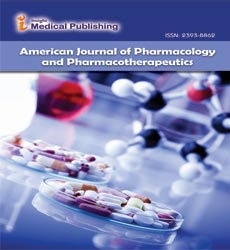ISSN : 2393-8862
American Journal of Pharmacology and Pharmacotherapeutics
Pharmacogenetic Testing Guidelines: Standards for Clinical Decision-Making
Raneem Alberto*
Department of Clinical Pharmacy, King Saud University, Riyadh, Saudi Arabia
- *Corresponding Author:
- Raneem Alberto
Department of Clinical Pharmacy, King Saud University, Riyadh,
Saudi Arabia,
E-mail: alberto@gmail.com
Received date: May 29, 2024, Manuscript No. IPAPP-24-19308; Editor assigned date: May 31, 2024, PreQC No. IPAPP-24-19308 (PQ); Reviewed date: June 14, 2024, QC No. IPAPP-24-19308; Revised date: June 21, 2024, Manuscript No. IPAPP-24-19308 (R); Published date: June 28, 2024, DOI: 10.36648/2393-8862.11.2.181
Citation: Alberto R (2024) Pharmacogenetic Testing Guidelines: Standards for Clinical Decision-Making. Am J Pharmacol Pharmacother Vol.11 No. 2:181.
Description
Pharmacogenetics is a branch of pharmacology that explores how genetic variations influence individual responses to medications. It focuses on understanding how genetic factors impact drug metabolism, efficacy, and toxicity, aiming to personalize treatment approaches for better clinical outcomes. This comprehensive exploration delves into the principles, applications, challenges, and future directions of pharmacogenetics in modern healthcare. Genetic Variability Individuals differ in their genetic makeup, including variations in genes encoding drug-metabolizing enzymes, drug transporters, and drug targets. These genetic differences contribute to variability in drug responses among patients. Drug Metabolism Genetic polymorphisms in enzymes such as cytochrome P450 (CYP) affect drug metabolism rates. Depending on the variant alleles inherited, individuals may metabolize drugs more rapidly or slowly, influencing drug efficacy and potential toxicity. Drug Targets Variations in genes encoding drug receptors or targets can alter drug binding affinity or downstream signaling pathways, affecting therapeutic responses. Genetic polymorphisms in these targets may explain differences in drug sensitivity or resistance.
Oncology
Pharmacogenomic biomarkers specific genetic markers, identified through pharmacogenomic studies, serve as indicators of drug response variability. These biomarkers guide clinicians in tailoring drug therapy based on individual genetic profiles. In oncology, pharmacogenetic testing guides the selection of chemotherapy agents and targeted therapies. For example, testing for HER2 gene amplification in breast cancer patients determines eligibility for HER2-targeted therapies like trastuzumab, improving treatment efficacy and patient outcomes. Pharmacogenetic testing helps psychiatrists optimize medication selection for patients with mental health disorders. Genetic variations in genes encoding drug-metabolizing enzymes (e.g., CYP2D6) influence responses to antidepressants and antipsychotics, guiding personalized treatment plans. Pharmacogenetic insights inform the use of anticoagulants and antiplatelet agents in cardiovascular diseases. Genetic testing for variants in genes like VKORC1 and CYP2C9 helps predict warfarin dosing requirements, minimizing bleeding risks and optimizing therapeutic anticoagulation. Infectious disease pharmacogenetics aids in managing antiviral and antibacterial therapies. Genetic testing for HIV patients determines resistance mutations to guide selection of antiretroviral drugs, enhancing virologic suppression and preventing treatment failure. Genetic diversity variability in genetic markers among different populations necessitates comprehensive databases and studies to validate pharmacogenetic associations across diverse ethnic groups. Integrating pharmacogenetic testing into routine clinical practice requires standardized guidelines, clinician education, and infrastructure for genetic testing and interpretation. Genetic testing costs, insurance coverage, and disparities in access to testing may limit widespread adoption of pharmacogenetic-guided therapy, particularly in resource-limited settings.
Patient empowerment
Issues related to informed consent, patient privacy, and the use of genetic information in healthcare decision-making require ethical frameworks and regulatory oversight. Precision integration of pharmacogenetics into precision medicine initiatives aims to tailor drug therapy based on individual genetic profiles, improving treatment efficacy and safety. Utilization of artificial intelligence and big data analytics enhances pharmacogenomic research, facilitating identification of novel genetic variants and predictive models for drug response. Pharmacogenomic therapeutics Development of pharmacogenomicbased therapeutics, such as gene editing technologies (e.g., CRISPRCas9), holds promise for correcting genetic variants underlying drug metabolism deficiencies. Patient education and engagement initiatives promote awareness of empowerment and education patient empower patients to participate in personalized treatment decisions. Pharmacogenetics revolutionizes clinical practice by leveraging genetic insights to customize drug therapy according to individual genetic profiles. By identifying genetic variations that influence drug metabolism, efficacy, and safety, pharmacogenetics enhances treatment outcomes, minimizes adverse effects, and optimizes healthcare resources. As research continues to uncover new genetic associations and technological advancements facilitate broader, implementation pharmacogenetics remains pivotal in advancing personalized medicine and improving patient care across diverse medical specialties. Embracing these opportunities ensures that pharmacogenetics continues to shape the future of healthcare, providing tailored treatment strategies that maximize therapeutic benefits for each patient.
Open Access Journals
- Aquaculture & Veterinary Science
- Chemistry & Chemical Sciences
- Clinical Sciences
- Engineering
- General Science
- Genetics & Molecular Biology
- Health Care & Nursing
- Immunology & Microbiology
- Materials Science
- Mathematics & Physics
- Medical Sciences
- Neurology & Psychiatry
- Oncology & Cancer Science
- Pharmaceutical Sciences
